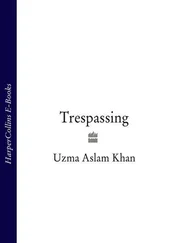Irfan had answered with a proverb— a Gujjar will sleep where no man will walk —which made her husband smile, before he replied, “Many men have walked and slept in that cave. I assure you, none became saints.” He sat so tidily, this Irfan. Even when trying to inflict penance on himself in the cave, his shoes still looked polished. He had eventually returned home to the city. But now he was back, and Maryam could see he had not recovered. His cheek had sunk; his eye was dim. She was glad they had momentarily lit up when he walked toward their tent earlier this afternoon, to embrace her husband again.
The other — Irfan had pointed him out in the distance, she had not caught the name — had apparently also been here before, but Maryam found no recollection of him. He seemed to her to have no tongue. He followed Irfan’s lead while his eye drifted constantly, toward her tent, toward the lake, toward the Angrez woman reaching for Kiran’s hand.
The woman walked like a goat. She was too eager. Maryam had seen it before, good-hearted foreigners wanting to be friendly with local folk. They often selected the children, as that woman did now. Perhaps these Angrez needed to feel differently about themselves when they came all the way across the seas and all the way up the glacier to see the lake. She was not unfamiliar with the need. The lake seemed to inspire it. When you looked in the mirror of its surface you wanted to see something you wanted to see. And Maryam had seen the two looking in the lake, the friend of Irfan and the woman, when they first arrived. Though she was too far away to know, she took a guess. They were pleased with whatever else the lake had given.
Maryam also wanted to see something else whenever she peered inside, though she could never say what. Still or ruffled, the water’s surface only heightened her desire but never sated it. Perhaps it was because she came — two, maybe three thousand years ago — from a landlocked sea. If a sea has nowhere to go, it must go in circles, like this lake at the foot of Malika Parbat, churning round and round in a bowl, the clouds reflected in dizzying speed, stirring up some limitless need. Yes, it was like that, she thought, watching Kiran chase her goat up a hill while the woman who walked like a goat chased her. In Maryam there was no simple need, such as the need to be charitable with the children of the poor. She had nothing to repent, or correct, really. It was more the need to, to … She frowned, unable to speak the word, or even put her finger on it.
She went back to fingering her braid, back to thinking of the cave, the one that could change shape.
If her grandmothers had once sheltered in it on their way down from the steppe, earlier this year, her children had sheltered in it on their way up from the plains. The cave was low and stained black from a million fires, including her own. But only she knew about that — she, and Ghafoor. The man who first showed her the cave, telling her it led all the way to Tashkent. She shook her head. No, she would not think of him now.
Her husband believed the cave was unsafe. Instead of becoming saints, the men who slept in its bowels became thieves. They saw the telltale sparkle in the seams of the rock and, over time, had scraped it clean. Crude attempts at holding the ceiling up still remained; wooden pillars were jammed haphazardly everywhere across the uneven floor. Her children had played with the pillars, shaking them like salt. She let them. She knew the ceiling would hold. They asked for the story every spring, on their way up to the lake, the story of Prince Saiful Maluk and Princess Badar Jamal. If it rained and they needed to step into the cave for a time, as had happened this year, the story grew even more magical because it grew even more real: this was the cave that had cradled the lovers as they fled the terrible jinn who lived by the lake. And when at last her family had continued on their way, a thirsty herd lowing and bleating beside them, shepherded by two gaddi dogs, when they had reached the lake this April, as on every April, the story became even more deliciously terrible: this was the jinn’s lake. He lived along its shore —this shore!
But he had never hurt them, the jinn. Not in all the springs and summers they had camped at Malika Parbat’s feet. He had blessed the lake where the fairies came to bathe at full moon. He had blessed these hills where Maryam could roam as freely as the goats and horses. He had blessed the peak of Malika Parbat, who was a pari khan, a ruler of all fairies, and who entrusted him with the task of keeping the fairies in check. He had blessed Maryam’s secret shrine too, so that Maryam could pray undisturbed in its womb. He had even blessed her taste buds, so that everything here tasted true, the fruit and the honey.
Then why the misgivings? Perhaps it was the wind, again.
A little honey stuck to her flesh from the food wrapped for the guests. Licking it clean, she watched the clouds drift and Malika Parbat scatter into segments in the lake like the rungs of a ladder. What else did she want to see? She could still find no word for it, though the ladder was there, at the bottom of the lake, and if she wanted, she might step right into the void.
Queen of the Mountains: A Land Outside Land
Her earliest memories were of movement. On horseback, in her father’s arms, on her brother’s back. She could not say if it was her own crossing she remembered, or that of her mother, grandmother, or some woman whose name she would never know. What she did know was that theirs had always been a fight for mobility. They could only be governed if they stayed. For every way of limiting movement, there was a way to move.
No one knew this better than Ghafoor.
So, she could no longer push thoughts of him away.
Maryam walked to the far side of the lake, which was free of boats. Though the scent lingered, her fingers were licked clean of the honey. The water swayed.
The first time she saw him, she saw through him. He was the tunnel in the mountain, the break in the hill, the hand in the hollow. He was the air that teased the braid circling her face, the cloud that yawned apart in the lake. He was a door to the other world, the world outside the mountains. And he had left her a sign in the cave.
She had seen the sign on their way up from the plains, when her family took shelter from the rain, but she had not dared acknowledge it in their presence. Her husband might say the cave was dangerous, turning would-be saints into thieves, but to her it was many things, and none were dangerous. It was, for instance, a shrine. And a messenger. Because of the cave she knew he was coming. In the months since camping here at the edge of the lake, each time she withdrew to the shrine in secret, she fingered the sign.
Now Maryam’s footsteps hastened as she reached the far shore. When she thought no one was looking, she climbed up the hill furthest from the boats and tents, looking over her shoulder one last time for just the briefest moment. Their tent, made of plastic sheeting, was still sagging at one corner. Earlier today, she had told Kiran to fix the stick that propped it, but Kiran was with that Angrez woman, the one who walked like a goat, and her other two children were playing with the children of a neighboring tol. No one noticed Maryam. This was her window.
She walked briskly. Far to the north, hidden behind clouds, hidden from those who could not imagine him, Nanga Parbat kept watch while Malika Parbat admired her reflection in the lake.
He had come to her, at first, like a prophet. Honey on his fingers and a tale to tell. There was a land outside land, outside mountains, even, and it was where she had come from, and where a part of her would return. Over the Pamirs . That far.
Читать дальше












